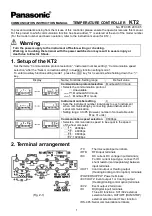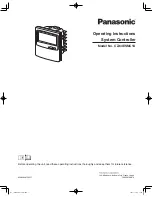
Operation
1. Turn fans on and off using the fan switch. It is normal
for the fans to remain running after the switch is
turned off. The exhaust thermostat will open after
heat is no longer present under the hood which will
activate the timed relay to begin its countdown.
Once time has expired, fans will shut down. The
timed relay is adjustable from 1-100 minutes. The
recommended time delay setting is approximately
20 minutes.
2. In the event that the cooking equipment is started
without turning the fans on manually, the fans will
turn on automatically and remain running with the
presence of heat under the hood. The exhaust
thermostat will open after heat is no longer present
under the hood which will activate the timed relay to
begin its countdown. Once time has expired, fans
will shut down.
Testing
1. Turn fan switch on, then off to ensure proper fan
operation before cooking equipment is started. Once
this is verified, testing can proceed.
2. For testing only, locate the time delay relay. Turn the
time adjustment knob counterclockwise to the first
mark in order to expedite the testing process. Make
a note as to where the time relay was originally set.
3. Heat up cooking equipment with fans off. Once the
temperature reaches the set point of the thermostat
the fans will start, preferably within 5 to 10 minutes.
If the fans take more than 15 minutes to start,
decrease the temperature set point by turning the
adjustment screw 1/16 turn clockwise. Do not apply
direct flame to the thermostat
4. If an adjustment was made in Step 3, repeat now.
5. After verification of fan start-up, shut down cooking
equipment. The fan switch should still be in the off
position. Once cooking equipment has cooled, the
thermostat will open triggering the timer function in
the time delay relay to begin. Once time has expired,
the fans will shut down. Thermostat operation can
be verified by checking voltage (115 VAC) between
terminal blocks T1-B and N1 in the control panel.
6. Once proper operation has been verified, set
the dial on the timed relay to its original setting
(approximately 20 minute delay).
CAUTION
The thermostats should never be exposed to direct
flame. This can cause permanent damage to the
thermostat.
NOTE
During testing, if fans do not start automatically in
the first 15 minutes of cooking equipment activation,
manually start fans to avoid accidental fire system
dump due to heat build-up.
Temperature Interlock
9






























